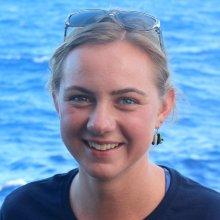
Sara Matasick
Tell us about your work/research. What kinds of things do you do?
I am a freelance wildlife cinematographer, with a background in wildlife ecology. I film wildlife and people around the world for documentaries that are broadcasted, streamed and/or online. Each project is different, in a different place, and with a different team, but I love that I always get to merge science, technology, and visual arts while helping shine a light on impactful stories.
What sparked your initial interest in your career?
Since I was little, I always loved being in nature and observing wildlife, so from a very young age I knew I wanted to share wildlife stories and help others fall in love with it too, so then they would want to preserve it. My parents always encouraged my interests, and also encouraged me to go play outside, and our family vacations often involved a National Park. So they definitely infused in me a love of the outdoors. Now, I get to continue exploring new places, and while I'm behind the camera I feel so tuned in and connected to the subject I'm filming.
Who influenced you or encouraged you the most?
Growing up in Ohio - in the Midwestern United States - I wasn't exactly surrounded by exotic wildlife. But I was instilled with a lot of enthusiasm, empathy and creativity from my Mom, a wonder for animals (especially birds) and patience for sitting in nature from my Dad, and curiosity from both. It's these qualities more than one specific wildlife event that made me see the beauty even in my own backyard, appreciate the complexity of the world, and want to share that with others.
What element of your work/study do you think is the most fascinating?
Each new project brings a new subject, place, environment and people that I get to learn about. I love being a sponge (shallow reef or deep-sea!) and immersing myself in each new story. Then, I get to help that story reach people all over the world through film. Again, that combination of science and art is so challenging and rewarding, and I love that I get to share it to make a difference.
What other jobs led you to your current career?
Becoming a wildlife cinematographer is not a direct or easy path, and nobody goes at it the exact same way. I was lucky in that I always knew I wanted to do this, but it still felt so out of reach. I studied Wildlife Ecology so I could understand our natural world and how we humans impact it, and it impacts us. I then got a Master's in Wildlife Filmmaking to learn the production side of things and break into the film world. I'm happy to say both my degrees were useful! But what's most useful are the opportunities I sought out along the way. I interned for an aquarium, did ornithology field research, worked in an art reproduction shop, assisted on local films, volunteered for local photographers, sought out mentors...and eventually I had the experience to work my way into productions and get where I am today. I believe every experience can be relevant and teach us something that will help us progress.
What are your degrees and certifications?
Bachelor of Science in Wildlife Ecology with a Certificate in Environmental Studies from the University of Wisconsin-Madison, 2014
Master of Arts in Wildlife Filmmaking from the University of the West of England, 2017
FAA Drone Pilot Certification, 2019
Wilderness First Responder through NOLS, 2024
SSI Open Water SCUBA, 2024
What are your hobbies?
In my free time I enjoy tennis, kayaking, hiking, baking (pies are my favorite), singing, doing any arts and crafts, and I recently started learning to play the mandolin.
What advice would you give someone who wants to have a career like yours?
It takes perseverance to make it as a freelance cinematographer, and the wildlife documentary niche is a really competitive field, but if you see each opportunity as a learning experience and always push yourself forward, you can do it. Support your peers, help those who are less knowledgeable than you, be open to learning from those who are much more knowledgeable than you, stay curious, practice, and don't give up.
How did you get involved with the Nautilus Exploration Program?
I started as a video engineering intern and was invited back as a video engineer. As a video engineer, I can see all cameras at once and really get a 360 view around the ROVs as we explore - while eagerly looking ahead to what’s just beyond the reach of the lights, it’s exciting to know that any second could present some new ocean creature or never-before-seen landscape. Being on board is a constant learning experience, like a floating classroom, as we're working alongside experts in their fields. I love getting to absorb all they can share. It's an amazing, open, collaborative environment.
Expeditions
Sara participated in the following Ocean Exploration Trust expeditions:
